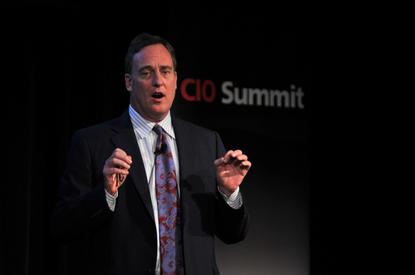CMOs seen to be more business savvy than CIOs
- 25 July, 2014 12:50

IDC's Richard Vancil
CMOs, more so than CIOs, are viewed as business savvy, customer-driven people who initiate programs that deliver revenue and growth for their organisations. But that doesn’t mean much if they don’t have a good understanding of how to operate and use technology to their advantage, says IDC’s group VP executive advisory strategies, Richard Vancil.
Speaking at the CIO Summit in Sydney, Vancil said CMOs are seen as good business people, but they do not have the level of technical ability in their team to really drive value from IT.
“I’ve seen CMOs and their teams day in, day out dealing with their lead generation etc, where there's literally abandoned islands of technology in the marketing department [and] no-one knows how to use them,” he said.
Vancil gave an example of an organisation he worked with that hired a full-time vendor consultant to train marketing staff on how to use a new piece of software. Only one person from marketing was able to use the software, and even then, they were baffled by it, he said.
Vancil said there's been much discussion and concern around CMOs controlling more of the technology spend in organisations than the CIO. IDC says in 2017, the marketing department will see the highest growth for IT spending at 10 per cent compounded annually.
“There are some who have said that marketing is going to do this on its own, and as a self empowered part of the business, they can manage all of these technologies. But I think that is absolute nonsense."
According to IDC’s research, there are 78 separate categories of technology relating to marketing in the current market, with hundreds and hundreds of vendors to wade through.
“If I was the CMO I would be really overwhelmed with this, and that’s where the CMO needs a lot of help,” Vancil said.
It can be difficult for CMOs to know which technology they are going to get the most value from, which is the most cost-effective, won't interfere with existing systems, and which systems have adequate security capabilities. These are things CMOs don’t necessarily think about in their purchasing decisions, he said.
Vancil said CIOs need to guide CMOs when purchasing technology. This is a different approach to wanting to take total control of the tech spend and dictating to CMOs what they can and can’t do, which are often marketing’s reasons for bypassing IT.
Guiding CMOs is about agreeing on criteria or standards in technology, as well as suggesting specific solutions that the business could benefit from, he said.
Vancil said it is important for organisations to take inventory every time a new technology is introduced particularly with marketing making IT purchasing decisions that are independent of IT. Not having a good understanding of what technology is being deployed in the organisation means there’s a lot of risk, he said.
CIOs also need to go beyond being a support function for marketing, and get an understanding of how customers and buyers work so that they can help deliver more tailored solutions for marketing, he added.
“The first question I would ask to your CMO when you go for lunch with him or her is: What is our new buyer’s journey here at XYZ company? Let’s talk about how our customers are behaving today. What’s their path as they come to us as a prospective buyer? The CIO should really take sincere interest in that.”

